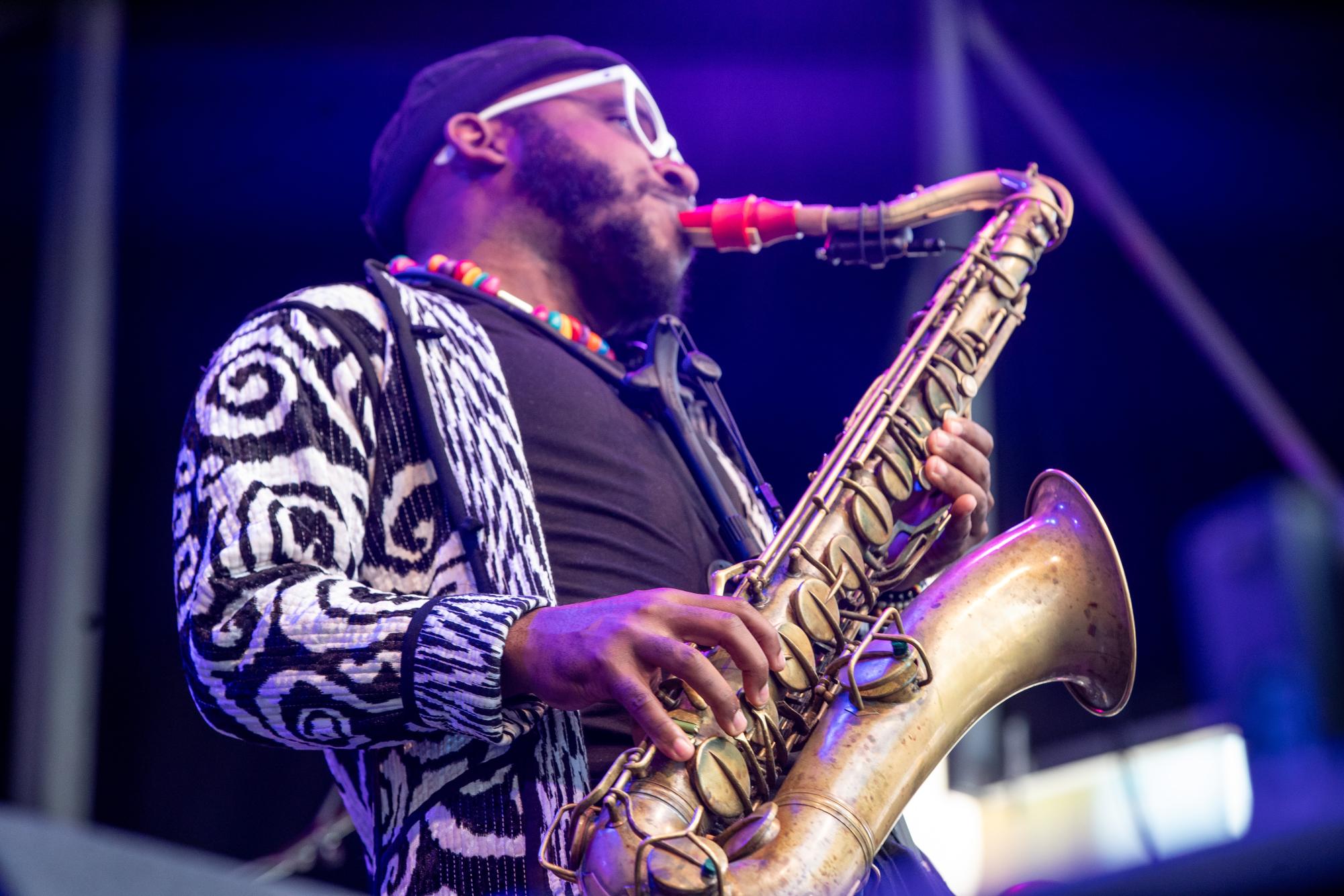14th Annual Pittsburgh International Jazz Festival


A jazz musician plays at the Pittsburgh International Jazz Festival.
The August Wilson African American Cultural Center held the 14th annual Pittsburgh International Jazz Festival from Sept. 19 to 22. The breezy, sunny weather complimented the upbeat tempo of live jazz playing from either side of the street. Taking over East Liberty, seas of folding chairs filled with festivalgoers waited in front of an empty stage for the next set.
The Pittsburgh International Jazz Festival bridged the beginning of autumn with the ending of summer. The jazz community celebrated the season change with artists and local businesses.
The AWAACC cultivated a diverse crowd. The festival welcomed artists from around the world, including Cuba, Brazil, the United Kingdom and across the United States. Chelsea Thompson, a Pittsburgh local, appreciated the crowd’s range.
“I’ve enjoyed seeing a multigenerational crowd,” Thompson said. “There are kids running around having fun, there are elders here, there are people our parents’ age here. It just feels like, you know, there is a little bit of everybody.”
The AWAACC named resilience as the theme for this year’s festival. Jazz music has historically been a form of resilience since the genre’s creation. At the end of her set, Endea Owens honored Trayvon Martin, a victim of gun violence. The crowd quietly watched as she dedicated her performance and applauded as Owens ended her speech about Martin. The August Wilson African American Cultural Center hosts many similar events, and a full calendar can be found on its website.
This was Thompson’s, and many other attendees, first year attending the event.
Rich Rayburg, a resident of Beechwood, has been coming to the PIJF for over 10 years. Whether their first year or tenth, festival-goers were able to interact with jazz fans from all over Pittsburgh and the country.
“I think people have always gotten along well here,” Rayburg said. “People always make an effort to respect their neighbors here and everything … it’s always been a nice festival.”
The jazz festival gives visitors an opportunity to explore Pittsburgh, its culture and its communities. Thompson compared her experience at the PIJF to past concerts and festivals. The usual chaos that comes with music events was notably absent from the event. As opposed to most concerts or festivals, the attendees at the PIJF stayed in their seats and gave the performers as well as other attendees enough space to dance along with the music.
“I go to festivals around the country, and I like that this one feels … there is kind of a chillness to it. Everyone feels comfortable,” Thompson said. “There is a beautiful kind of energy from the music, but it’s not … intense to the point where you feel uneasy.”
With a multitude of local restaurants, there were many options for hungry festival-goers. The festival offered a wide variety of cuisines — soul food, Mexican, Jamaican and more. Attendees slowly strolled from 10th Street to Seventh Street, as they browsed the food trucks and event sponsor’s booths. Though some vendors had lines stretching down the block, customers danced along to the music and conversed while they waited.
Press House Coffee and Uncle Rick’s Smokehouse were popular choices. Press House even released a special blend in collaboration with the festival called “Long Short Long.”
“It’s really great to see local vendors,” Thompson said. “The food is great.”
Brian Schmelzer, an audio engineer, mixed for the PIJF for the first time this year. Schmelzer discussed the festival’s move from Highmark Stadium back to East Liberty, and the switch back to free admission.
“It was a little more exclusive and they charged for tickets the past few years, so I think everyone is quite a bit more excited that it is actually back here again,” Schmelzer said.
Free admission allows a large group of people to attend who would not have been able to if tickets were costly. The lack of charge attracted many audience members who would have been put off by the hefty price, like budgeting college students and pedestrians walking by who were previously unaware of the event.
Mercedes Martinez, a sophomore economics major, saw the crowd while walking down the street. The festival pulled in a larger crowd as the evening began.
“Now there are tons of people,” Martinez said. “It is actually so awesome”.
Kimberly Jacobs, the curator and exhibitions manager for the August Wilson African American Poetry Center, discussed the representation throughout the crowd.
“Pittsburgh is so diverse. I think it’s a good representation of all of the people, all of the different communities,” Jacobs said. “Everybody just comes together.”
Both the crowd and vendors served as representations of the City’s diversity.
“We will definitely be back,” Thompson said.
Recent Posts
First Place | The summer apartment
See two girls: one 19, the other 20. They’re both engineering students far from home,…
Second Place | Moist and buttery gluten-free coffee cake
This gluten-free coffee cake is so indulgent you would never even know it was free…
Third Place | Dinner rush
Runner, please. Hands. Behind. 86 zucchini. Heard. There’s a slight ringing in my ears, and…
Runner-Up | Let me tell you about hobbies and death
Well, everyone has to have a hobby. Mom says you gotta love something or else…
Runner-Up | Artemis
In her dream, the moon exploded. Something hit it from behind — some dark shadow,…
Runner-Up | Setting the scene
My father and I are running through the forest. Our footsteps pound with silent desperation…




